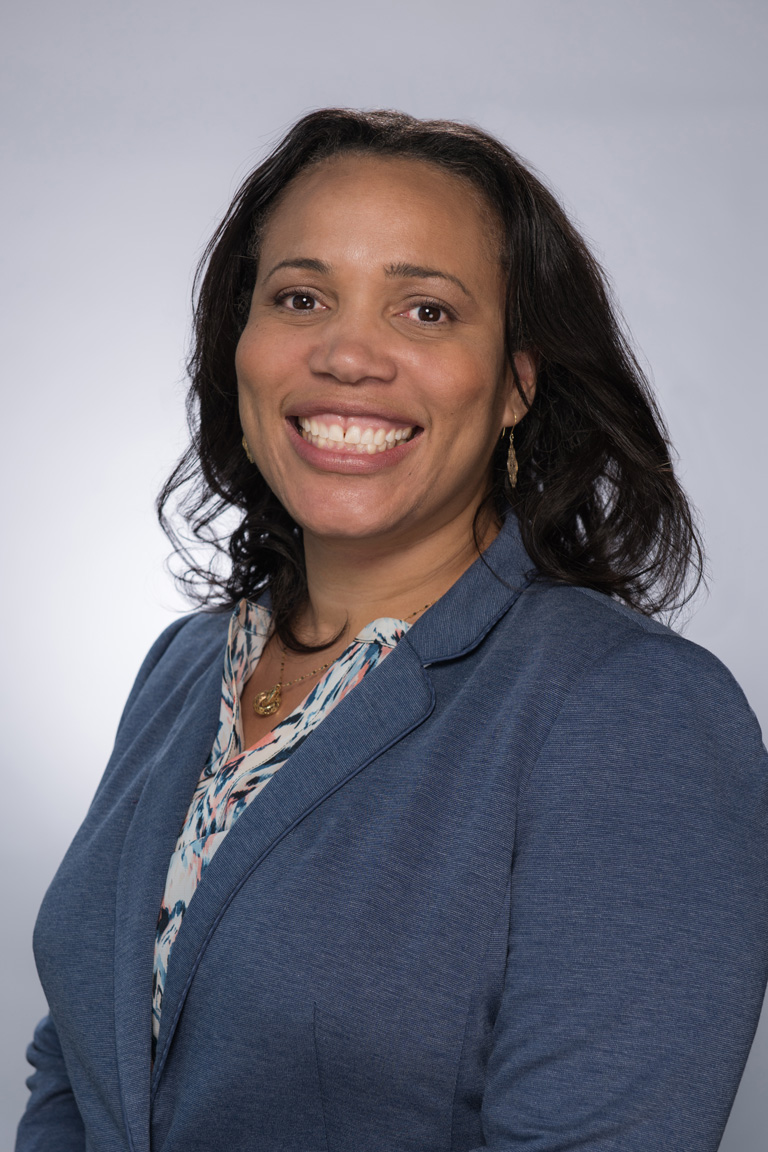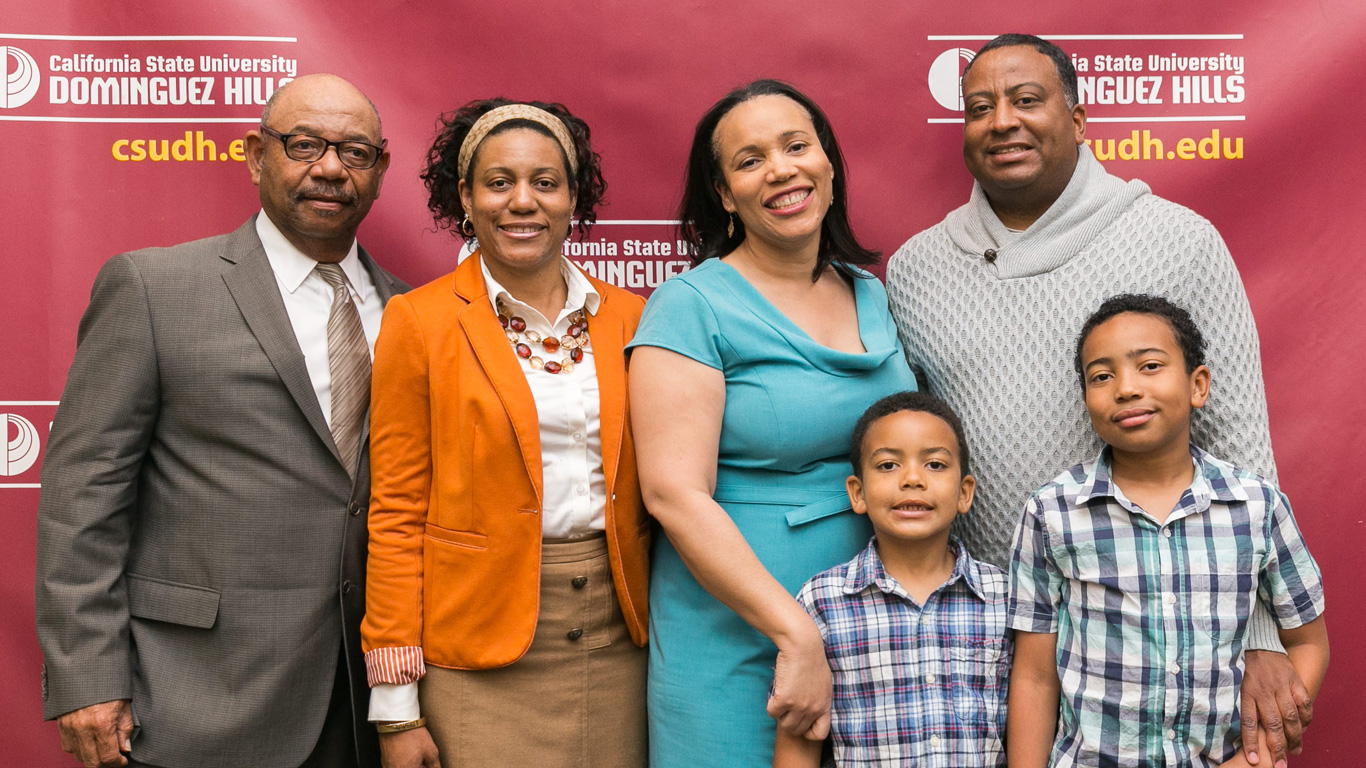 With an engaging personality that enables her to “work effectively” with “anyone,” and an innate talent for nurturing students as fellow researchers, Keisha Paxton, professor of psychology and director of California State University, Dominguez Hills’ (CSUDH) Faculty Development Center (FDC), was honored with the 2016 Presidential Outstanding Professor Award.
With an engaging personality that enables her to “work effectively” with “anyone,” and an innate talent for nurturing students as fellow researchers, Keisha Paxton, professor of psychology and director of California State University, Dominguez Hills’ (CSUDH) Faculty Development Center (FDC), was honored with the 2016 Presidential Outstanding Professor Award.
Paxton will carry the University Mace, an honor reserved for highly distinguished faculty members, at the College of Natural and Behavioral Sciences Commencement Ceremony at 9 a.m. on Friday, May 20.
The Presidential Outstanding Professor Award recognizes “excellence in teaching and overall contributions in research and service as a member of the CSUDH campus community.”
Paxton said she takes great pride in teaching and working at CSUDH, particularly because of the role the university plays in educating such a diverse student population.
“We have educated thousands of students from diverse backgrounds here, many of whom have gone on to earn advanced degrees, but we cannot rest on our laurels,” said Paxton, a tenured professor of psychology who began teaching at CSUDH in 2005. “We have to continue to support our students and see potential in them that they might not see in themselves.”
Paxton’s students benefit from her drive and success as an educator and researcher, and from her skill in developing valuable “educational experiences” for undergraduate and graduate students.
“I take this role [as professor] very seriously, as I have the privilege of playing a significant role in providing our students with a high-quality educational experience,” Paxton noted. “A review of my syllabi shows that a great deal of care and detail goes into the preparation of my courses. Students routinely report to me that they appreciate the organization of my courses; that I follow the syllabi, and that they always know what to expect.”
Paxton was appointed director of the Faculty Development Center in fall 2014. Her overall role is to “develop programming to facilitate effectiveness in teaching among faculty.” Several of her fellow faculty members shared their experiences working with Paxton in faculty award nomination letters, such as Marisela R. Chavez, associate professor and chair of Chicana/Chicano Studies, and a fellow 2016 Faculty Award recipient.
“I have had the pleasure of working with Dr. Paxton in her role as the director of the Faculty Development Center on various projects related to my role as coordinator of high-impact practices for the university,” wrote Chavez. “We worked on planning and organizing the campus’s first High-Impact Practices Teaching Symposium; organizing and coordinating the campus’s first Faculty Learning Community program; and preparing, planning and implementing the ‘Freshman Dream Seminar’ for first-year students.”
 Mark Carrier, professor of psychology at CSUDH, believes Paxton’s warm personality is critical to her success in working with colleagues.
Mark Carrier, professor of psychology at CSUDH, believes Paxton’s warm personality is critical to her success in working with colleagues.
“With her ever-present wit and a constant smile on her face, combined with a thoughtfulness for being professional, Keisha is a welcome presence for her students, her research laboratory staff, and her faculty-member teammates,” wrote Carrier in his nomination letter. “Most likely, the interpersonal glow that she generates is also what allows her, more than almost anyone else who I know on campus, to interact with and effectively work with some of the most difficult personalities.”
Paxton’s service extends beyond the Department of Psychology. At the university level, she sits on five Western Association of Schools and Colleges (WASC) Senior College and University Commission committees and taskforces, as well as coordinates both the First-Year Seminar program and the Quality Assurance Program for Effective Online Teaching. She obtained funding from the California State University (CSU) Office of the Chancellor to redesign the course Abnormal Psychology, and a grant to train CSUDH faculty to teach online.
For the CSU, Paxton serves on such leadership bodies as the Faculty Development Council and the Planning Committee for the CSU Symposium on University Teaching. She is also a co-investigator for the California HIV/AIDS Research Program (CHRP), a state-funded grant for AIDS-related research in California.
“During the 15 years I have known Dr. Paxton she has distinguished herself as a conscientious and energetic leader in the field of sexual risk behavior among people of color. I have enormous respect for her research and clinical skills,” said Didra Brown Taylor, a part-time faculty member in CSUDH’s Psychology Department. “Her true métier appears to be the application of community-clinical research paradigms and mentoring student research assistants.”
Paxton’s work has also been published in a variety of peer-reviewed journals, such as American Journal of Community Psychology, Ethnicity and Disease, and the Journal of HIV and Infectious Diseases.
Paxton has also presented research at conferences and symposiums, such as Western Psychological Association, the Society for the Advancement of Chicanos and Native Americans in Science (SACNAS), and the National Council for Black Studies, where students served with her as co-authors or co-presenters based on their research. She has also mentored numerous students to prepare them to present research during CSUDH’s Student Research Day.
“I’ve seen such potential in many of my students, and one of my greatest joys is pointing out those talents to them,” she said. “When we [educators] actively notice their potential to achieve doctorates and continue along the educational pipeline, we are changing the face of academia.”